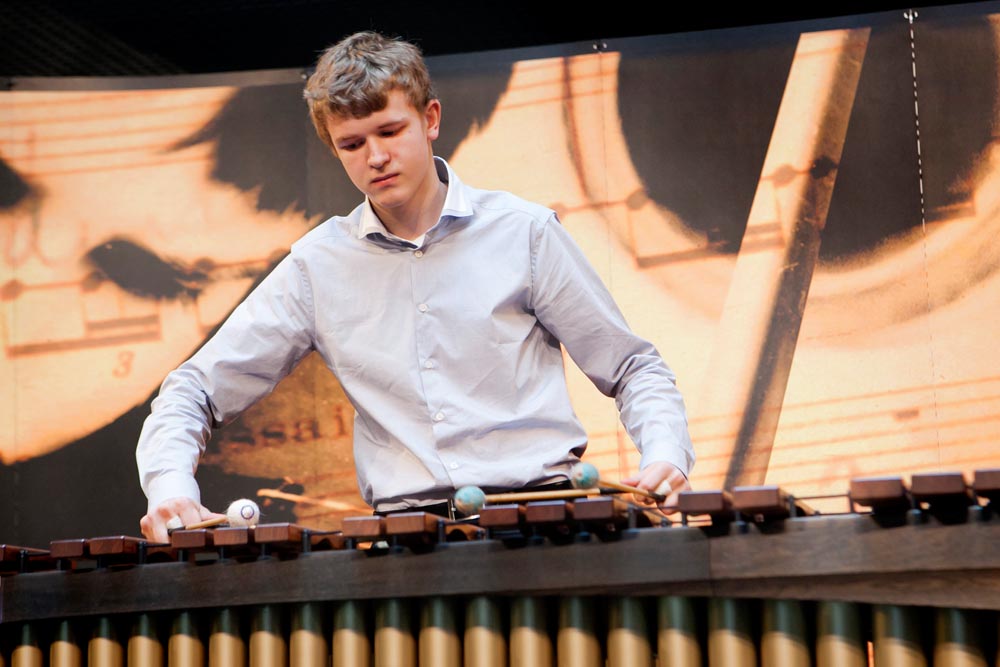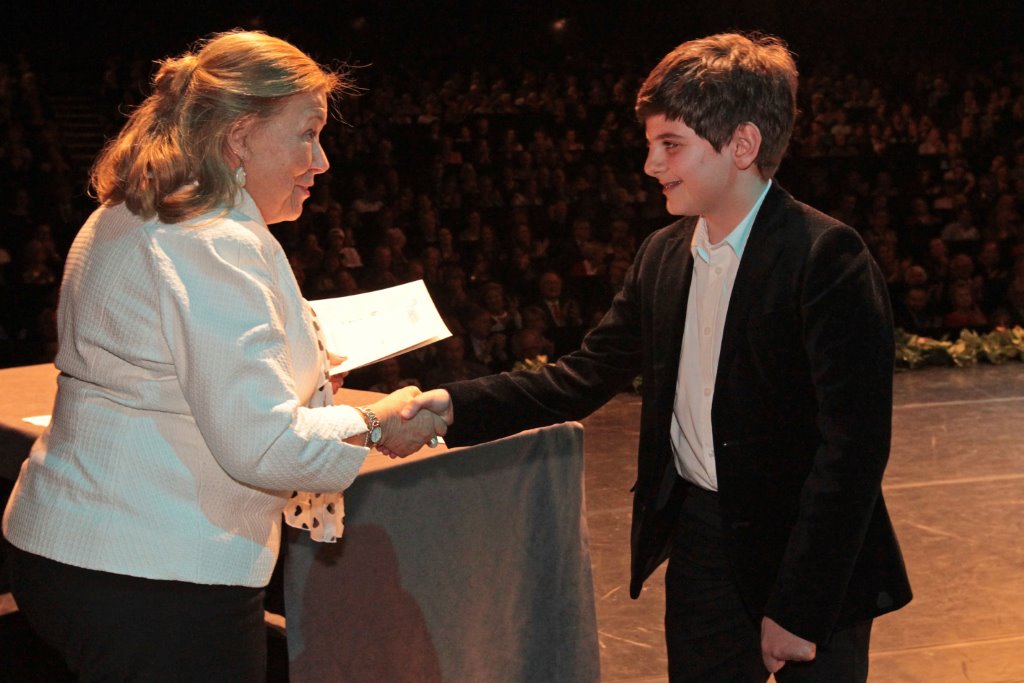Zondagmiddag 26 april zat ik in de persjury bij de finale van het Prinses Christina Concours in Lucent Danstheater te Den Haag. Bepaald geen straf, want alle zes finalisten speelden op topniveau, hoe jong en onervaren ze ook waren. Keer op keer bewijst de organisatie dat al het gesomber over de toekomst van klassieke muziek onzin is: ook dit jaar waren er ruim vierhonderd aanmeldingen. Het zit met jongeren en klassieke muziek dus echt wel snor. De persprijs ging naar de zestienjarige marimbaspeler Martijn Boom.
Boom had verreweg de beste podiumpresentatie: hij wekte de indruk dat dit bepaald niet zijn eerste optreden was voor een grote zaal vol publiek. Gestoken in zwarte blouse en dito broek wandelde hij ontspannen het podium op, nam het applaus in ontvangst en gaf vervolgens in opperste concentratie een vlekkeloze, bijzonder expressieve uitvoering van Variations on Japanese Children Songs van Keiko Abe. Nu eens aaide hij met zijn stokken over de toetsen in verdroomde Debussyachtige notenslierten, dan weer haalde hij fortissimo uit in dreigend dissonante samenklanken.

Boom is een echte verhalenverteller. Hij houdt de spanning vast van A tot Z, schuwt het drama niet en is één met zijn instrument. Elke beweging wordt gemotiveerd door de muziek, waarbij hij beweegt met de gratie van een balletdanser. Zo maakte hij invoelbaar hoe Japanse moeders hun kroost voor het slapengaan niet alleen geruststellende verhaaltjes vertellen, maar ook waarschuwen voor boze draken. Boom presenteerde meteen ook het enige stuk van een nog levende componist – een vrouw bovendien. De vakjury gaf hem slechts een tweede prijs, maar we gaan van deze jongen nog veel horen.
Ook de overige jonge musici presteerden op een onwaarschijnlijk hoog niveau – hoewel geen van allen een vakopleiding volgt. De twaalfjarige altsaxofonist Benjamin Farber speelde vol overgave pittige bravourestukjes van Gottlieb en Plekhanov. Hoewel hij in het tweede stuk even de draad kwijtraakte, hield hij ons bij de les met zijn prachtig warme toon en soepele weergave van de halsbrekend snelle riedels in het stuk van Plekhanov. Ongelooflijk dat hij nog maar anderhalf jaar les heeft. Terecht beloonde de vakjury hem met een eerste prijs.
Die kreeg ook de dertienjarige pianist Andrei Makarov. Soeverein speelde hij een deel uit een Mozartsonate, waarna hij met groot inlevingsvermogen twee preludes van Sjostakovitsj tot leven wekte. Zijn spel zelf is communicatief, maar doordat hij aan het eind van een stuk stug naar zijn piano blijft staren, ontneemt hij het publiek de kans zijn waardering te uiten in applaus. Een doodzonde voor elke uitvoerder, daar valt voor Makarov nog een wereld te winnen.

Hetzelfde geldt voor het duo Mayu en Takehiro Konoe, eveneens onderscheiden met een eerste prijs. Het is overduidelijk dat de tweeling al van kindsaf samenspeelt: ze ademen als één lichaam en hun uitvoering van de Passacaglia van Händel was spatgelijk, ook in de razendsnelle pizzicatipassages. Communicatie met het publiek bleef echter achterwege en hun presentatie was wat houterig, pas naar het einde toe werden ze wat losser. Bonenstaak Takehiro moet bovendien op looples: hij sjokt het podium op en af alsof hij eigenlijk liever ergens anders zou willen zijn.
Tweede prijzen waren er voor de harpiste Michelle Sweegers (17 jaar) en de pianist Johannes Asfaw (14 jaar). Sweegers had het twijfelachtige genoegen het spits af te mogen bijten. Na een wat timide Pierné, ging ze de snaren met meer vuur te lijf in een robuust stuk van de Franse harpist/componist Carlos Salzedo. De pianist Johannes Asfaw maakte indruk met het virtuoze Scherzo nr. 2 opus 31 van Chopin. Hij had duidelijk over zijn presentatie nagedacht en liet zijn arm soms even dramatisch boven de toetsen zweven. Wellicht dankzij dit showelement werd hij beloond met de publieksprijs.
De middag werd vlot aan elkaar gepraat door oud-winnares Cathelijne Noorland, met korte introducties op de uitgevoerde werken en de musici. Zoals altijd overhandigde Prinses Christina de prijzen. Omroep Max maakte opnames, die woensdag 29 april worden uitgezonden in het Avondconcert op Radio 4.
